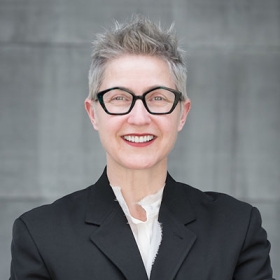
Mary Beth Heffernan is professor of sculpture, photography and interdisciplinary art.
Heffernan earned her BFA at Boston University in 1987, graduating Magna Cum Laude and awarded the Kahn Career Entry Award. She earned her MFA in the Photography Program at California Institute of the Arts in 1994, and appointed Fellow in the Studio program at the Whitney Independent Study Program 1994-95.
"I use a broad range of media and different modes of address abiding questions about physicality and representation: How are bodies transcribed into photographs, scans or algorithms? How do pictures literally and figuratively change our bodies and our relationship with others? How and when does language take on physical force? What are the gaps and failures of language to translate the complexities of the physical world, daily labor, bodily experience, and, more broadly, ourselves as subjects?"
Heffernan's 2014 social practice PPE Portrait Project to humanize the frightening protective gear worn by Ebola workers in Liberia garnered international recognition on NPR, PRI, the BBC the Los Angeles Review of Books, Hyperallergic, CSNBC and many other publications. The project was also featured in Tiffany Schlain's 2015 film The Adaptable Mind. The PPE Portrait Project was cited as an exemplary art and medicine collaboration in The Academies of Sciences-Engineering-Medicine Consensus Report of 2018, and featured in the 2019 permanent exhibition, Being Human, at the Wellcome Collection in London.
The PPE Portrait Project is currently enhancing COVID care in the US and abroad; Heffernan is partnering with over ten medical centers to adopt the project, including Stanford Medical School, USC-Keck, Boston Children's Hospital, Massachusetts General Hospital, UMASS and Providence St. Joseph. Heffernan's art-medicine COVID collaborations are reviewed in Hyperallergic and Smithsonian Magazine, and featured The Rachel Maddow Show, KQED, on CNN, CBSN/Boston, and KIRO Seattle.
Awarded the inaugural 2016 PAC/LA Contemporary Artist Grant@ The Huntington and the 2010 COLA Individual Artist Fellowship, Heffernan's work has also been supported by grants from the Arnold P. Gold Foundation, the Durfee Foundation and Light Work.
Heffernan's art is included in numerous private and public collections, including The Huntington Library, Art Collections and Botanical Gardens, the Hammer Museum/Grunwald Center Collection, Light Work of Syracuse, NY, the Los Angeles County Museum of Art and New York City Library.
Courses
ARTS 103 Sculpture Fundamentals
The aim of this course is to introduce the conceptual, technical, and critical tools central to contemporary sculpture practices. The class consists of a combination of technical seminars, in-class fabrication, critiques, field trips, informal lectures in contemporary art history, readings, and a series of short papers. Emphasis will be placed on the student's ability to make, understand, discuss, and write about sculpture in a substantive way.
ARTS 203 Intermediate Sculpture
Intermediate study in sculpture, including developing theoretical, historical, and critical understanding of materials and media. Emphasis may change from year to year.
ARTS 209 Photography Against the Grain
This course is a conceptual art class that takes photography as its subject. Using a wide range of photographs and photographic practices, the class will consider how photographs are instrumental in forming our notions of self, family, work, and nation. We will also grapple with the difference between analogue and digital photography and photography's relation to the physical world. The class will read key photography essays that will challenge students to think critically about the role of photography in contemporary culture and modernity, historiography, and science. We will use a broad range of art techniques like drawing, painting, printmaking, sculpture, digital alteration, and even craft techniques to remake and rework photographs to reveal hidden truths or create new meanings. Unlike some classes where you learn art techniques first, here you will be expected to adopt techniques and generate art from a set of ideas that arise from our readings, discussions, experiments, and field trips.
